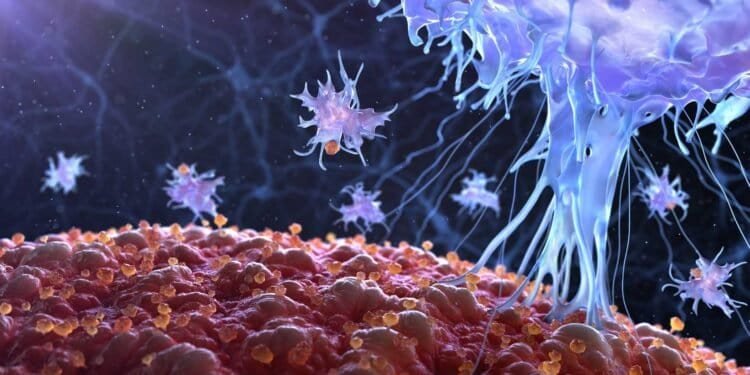CIRS (Chronic Inflammatory Response Syndrome) is a complex condition that is not yet fully understood, but it is known to have a significant impact on the immune system. It is characterized by a range of symptoms that can affect multiple systems in the body, including the respiratory, digestive, and nervous systems. Recent research has suggested that there may be a connection between CIRS and autoimmune disorders, which are conditions in which the immune system mistakenly attacks healthy cells in the body.

Understanding the connection between CIRS and autoimmune disorders is important because it can help to inform diagnosis, treatment, and prevention strategies. While the exact nature of the relationship between these two conditions is not yet clear, there is evidence to suggest that they may share some underlying pathophysiological mechanisms. For example, both conditions involve dysregulation of the immune system, which can lead to inflammation and tissue damage. Additionally, there may be genetic and environmental factors that contribute to the development of both CIRS and autoimmune disorders.
Key Takeaways
- CIRS is a complex condition that can affect multiple systems in the body, and it is characterized by dysregulation of the immune system.
- Autoimmune disorders are conditions in which the immune system mistakenly attacks healthy cells in the body.
- There may be a connection between CIRS and autoimmune disorders, and further research is needed to fully understand this relationship.
Understanding CIRS and Autoimmune Disorders
Defining CIRS
Chronic Inflammatory Response Syndrome (CIRS) is a condition that occurs when the immune system is unable to properly respond to a biotoxin. Biotoxins are substances produced by living organisms that can cause illness in humans. The most common biotoxins that can cause CIRS are mold, Lyme disease, and other tick-borne illnesses.
CIRS can be difficult to diagnose because the symptoms are similar to those of other conditions, such as fibromyalgia, chronic fatigue syndrome, and autoimmune disorders. Symptoms of CIRS can include fatigue, brain fog, joint pain, and gastrointestinal issues.
Overview of Autoimmune Diseases
Autoimmune diseases occur when the immune system mistakenly attacks healthy cells in the body. There are over 80 different types of autoimmune diseases, including rheumatoid arthritis, lupus, and multiple sclerosis.
Autoimmune diseases can be caused by a combination of genetic and environmental factors. In some cases, an infection or exposure to a toxin can trigger the immune system to attack healthy cells.
Inflammation is a common feature of autoimmune diseases. Inflammation is the body’s response to injury or infection, and it can cause swelling, redness, and pain. Chronic inflammation can lead to tissue damage and organ dysfunction.
In conclusion, CIRS and autoimmune disorders are two conditions that are related to the immune system. While CIRS is caused by exposure to biotoxins, autoimmune diseases are caused by the immune system attacking healthy cells. Both conditions can cause inflammation and similar symptoms, which can make diagnosis difficult.
Pathophysiology and Immune Response
Role of Cytokines and Inflammation
Cytokines are signaling molecules that play a crucial role in the immune response. Inflammatory cytokines, such as interleukin-1 (IL-1), interleukin-6 (IL-6), and tumor necrosis factor-alpha (TNF-α), are produced in response to an infection or injury. These cytokines trigger an inflammatory response, recruiting immune cells to the site of infection or injury.
In chronic inflammatory response syndrome (CIRS), the immune system is activated in response to biotoxins, such as mold or Lyme disease. This leads to the production of inflammatory cytokines, which can cause a wide range of symptoms, including fatigue, brain fog, and joint pain. In addition, chronic inflammation can contribute to the development of autoimmune disorders.
Immune System Dysregulation
Immune system dysregulation is a hallmark of autoimmune disorders. In these conditions, the immune system mistakenly attacks healthy tissues, leading to chronic inflammation and tissue damage. This dysregulation can be caused by a variety of factors, including genetic predisposition, environmental triggers, and dysbiosis (imbalance of gut microbiota).
In CIRS, immune dysregulation is thought to be caused by the presence of biotoxins, which can disrupt immune function. This can lead to a variety of immune-related symptoms, including allergies, asthma, and autoimmune disorders.
Overall, the relationship between CIRS and autoimmune disorders is complex and multifactorial. However, it is clear that both conditions involve dysregulation of the immune system and the production of inflammatory cytokines. By understanding the underlying mechanisms of these conditions, researchers may be able to develop new treatments and therapies to improve patient outcomes.
Diagnosis and Clinical Indicators

CIRS is a complex illness that can have a wide range of symptoms, making it difficult to diagnose. However, there are several clinical indicators that can help doctors identify CIRS in patients.
Biomarkers and Laboratory Tests
There are a number of biomarkers and laboratory tests that can be used to help diagnose CIRS. One of the most important is the presence of certain antibodies in the blood. These antibodies can be detected through a blood test, and their presence is a strong indicator of CIRS. Other laboratory tests that may be used include tests for inflammation markers, such as C-reactive protein (CRP) and erythrocyte sedimentation rate (ESR), as well as tests for mold toxins in the urine.
Imaging and Biopsies
Imaging tests, such as magnetic resonance imaging (MRI) and computed tomography (CT) scans, can also be useful in diagnosing CIRS. These tests can help identify areas of inflammation in the body, which can be a sign of CIRS. In some cases, a biopsy may be necessary to confirm the diagnosis. A biopsy involves taking a small sample of tissue from the affected area and examining it under a microscope.
It is important to note that while these tests can be helpful in diagnosing CIRS, they are not always conclusive. Doctors may need to use a combination of tests and clinical indicators to make an accurate diagnosis. Additionally, it is important to rule out other conditions that can have similar symptoms, such as autoimmune disorders.
Treatment Strategies and Prevention

Medical Therapies
There are several medical therapies available to treat autoimmune disorders in patients with CIRS. Corticosteroids are commonly used to suppress the immune system and reduce inflammation. However, long-term use of corticosteroids can lead to adverse effects such as weight gain, osteoporosis, and increased susceptibility to infections.
Another treatment option is immunosuppressive agents, such as methotrexate and azathioprine. These drugs work by suppressing the immune system and reducing inflammation. However, they can also increase the risk of infections and other adverse effects.
Intravenous immunoglobulin (IVIg) is another treatment option that can be used to treat autoimmune disorders in patients with CIRS. IVIg contains antibodies that can help regulate the immune system and reduce inflammation. However, it is an expensive treatment option and may not be covered by insurance.
Diet and Lifestyle Changes
In addition to medical therapies, diet and lifestyle changes can also play a role in treating and preventing autoimmune disorders in patients with CIRS. A healthy diet rich in fruits, vegetables, and whole grains can help reduce inflammation and support overall immune function.
Regular exercise can also help reduce inflammation and improve overall health. However, it is important to start slowly and gradually increase the intensity and duration of exercise to avoid exacerbating symptoms.
Stress management techniques, such as meditation and yoga, can also be helpful in reducing inflammation and improving overall health. Stress can exacerbate symptoms of autoimmune disorders and should be managed appropriately.
In summary, there are several medical therapies and lifestyle changes that can be used to treat and prevent autoimmune disorders in patients with CIRS. It is important to work with a healthcare provider to develop a treatment plan that is tailored to the individual’s specific needs and goals.
Autoimmunity and Genetic Factors
Autoimmunity is a complex process that involves multiple factors, including genetic predisposition and environmental triggers. In recent years, genome-wide association studies (GWAS) have identified numerous genetic variants associated with autoimmune disorders. These variants are involved in various biological pathways, including immune system regulation, antigen presentation, and cytokine signaling.
Genetic Predisposition
Genetic factors play a significant role in the development of autoimmune disorders. Studies have shown that the concordance rate for autoimmune diseases is higher in monozygotic twins than in dizygotic twins or other siblings, suggesting that genetic factors are involved in the pathogenesis of autoimmunity [1].
GWAS have identified several genetic variants associated with autoimmune disorders. For example, the HLA region on chromosome 6 is strongly associated with multiple autoimmune disorders, including type 1 diabetes, rheumatoid arthritis, and celiac disease. Other genetic variants associated with autoimmune disorders include PTPN22, CTLA4, and IL2RA [2].
Epigenetic Influences
Epigenetic modifications, including DNA methylation and histone modifications, can influence gene expression and play a role in the development of autoimmune disorders. For example, hypomethylation of the FOXP3 gene has been associated with the development of autoimmune diseases, including systemic lupus erythematosus and rheumatoid arthritis [3].
In addition to DNA methylation, histone modifications can also play a role in the regulation of gene expression. For example, histone acetylation and methylation can influence the accessibility of DNA to transcription factors, thereby regulating gene expression. Histone modifications have been implicated in the regulation of immune cell differentiation and function, and alterations in histone modifications have been associated with autoimmune disorders [4].
Overall, genetic predisposition and epigenetic influences play important roles in the development of autoimmune disorders. Understanding the genetic and epigenetic factors involved in autoimmunity may lead to the development of new therapeutic approaches for autoimmune disorders.
[1] NCBI
[2] NCBI
[3] NCBI
[4] Nature
Impact of Environmental Factors

Environmental factors play a significant role in the development of autoimmune diseases. In particular, Chronic Inflammatory Response Syndrome (CIRS) has been linked to several environmental factors, including infections, toxins, and lifestyle choices.
Infections and Vaccinations
Infections and vaccinations have been shown to trigger autoimmune diseases in some individuals. For example, the SARS-CoV-2 virus, which causes COVID-19, has been linked to the development of autoimmune disorders such as Guillain-Barre syndrome. Vaccinations, while generally safe, can also cause autoimmune reactions in some people.
Toxins and Lifestyle
Exposure to toxins such as mold, heavy metals, and pesticides has been linked to the development of autoimmune diseases. CIRS, in particular, is often caused by exposure to water-damaged buildings. Lifestyle choices such as smoking, poor diet, and lack of exercise can also contribute to the development of autoimmune diseases.
It is important to note that not everyone exposed to these environmental factors will develop an autoimmune disease. Genetic predisposition also plays a role in the development of these conditions. However, reducing exposure to toxins and making healthy lifestyle choices can help reduce the risk of developing autoimmune diseases.
CIRS and Autoimmune Disorders in Special Populations
Pediatric Considerations
CIRS is a condition that is often associated with a variety of autoimmune disorders. Although the condition is most commonly diagnosed in adults, it can also affect children. In fact, recent studies have shown that CIRS is becoming increasingly prevalent in pediatric populations.
Children with CIRS may experience a range of symptoms, including fatigue, joint pain, and cognitive impairment. These symptoms can be especially challenging for children, as they can interfere with academic performance and social activities.
Treatment for CIRS in children typically involves a combination of lifestyle modifications and medication. Lifestyle modifications may include dietary changes, exercise programs, and stress reduction techniques. Medications may include anti-inflammatory drugs, immune system suppressants, and other medications to manage symptoms.
Autoimmunity in Adults
Autoimmune disorders are more common in adults than in children. As a result, CIRS is also more commonly diagnosed in adult populations. Adults with CIRS may experience a range of symptoms, including chronic fatigue, joint pain, and cognitive impairment.
Treatment for CIRS in adults is similar to treatment for children, and may involve lifestyle modifications and medication. However, treatment for adults may also involve more aggressive interventions, such as surgery or radiation therapy.
The risk of developing CIRS increases with age, and elderly adults may be at higher risk for developing the condition. Additionally, pregnancy can also increase the risk of developing CIRS, as the immune system is suppressed during pregnancy to prevent rejection of the fetus.
Overall, CIRS is a complex condition that can affect individuals of all ages. While treatment options are available, it is important for individuals to work closely with their healthcare providers to develop a treatment plan that is tailored to their specific needs.
Future Directions in Research and Treatment
While much progress has been made in understanding the connection between Chronic Inflammatory Response Syndrome (CIRS) and autoimmune disorders, there is still much to be learned. Researchers are continuing to explore the underlying mechanisms of CIRS and potential biomarkers that may help diagnose and monitor the condition.
One area of research that shows promise is the use of RNA sequencing to identify gene expression patterns associated with CIRS and autoimmune disorders. This approach has the potential to provide insights into the molecular pathways involved in these conditions and may lead to the development of more targeted therapies.
Clinical trials are also underway to evaluate the safety and efficacy of novel therapies for CIRS and autoimmune disorders. These trials are exploring a range of approaches, including immune modulators, anti-inflammatory agents, and biologic therapies. While it is still too early to say which of these approaches will be most effective, the results of these trials will provide valuable insights into the treatment of these conditions.
In addition to developing new therapies, researchers are also working to identify immune biomarkers that may help predict which patients are at risk of developing CIRS or autoimmune disorders. By identifying these biomarkers, clinicians may be able to intervene earlier in the disease process and prevent the development of more severe symptoms.
Overall, the future of research and treatment for CIRS and autoimmune disorders looks promising. As more is learned about the underlying mechanisms of these conditions, new therapies and diagnostic tools will continue to emerge, providing hope for patients and their families.
Frequently Asked Questions
How does chronic inflammatory response syndrome (CIRS) interact with the immune system?
CIRS is a condition that occurs when the body is exposed to biotoxins from mold, bacteria, and other sources. These biotoxins can interfere with the immune system, leading to chronic inflammation and a variety of symptoms. CIRS can also disrupt the body’s natural detoxification processes, making it more difficult to remove toxins from the body.
Can long-term exposure to mold lead to the development of autoimmune conditions?
There is evidence to suggest that long-term exposure to mold can contribute to the development of autoimmune conditions. Mold exposure can cause chronic inflammation and disrupt the immune system, leading to a range of symptoms that can mimic autoimmune disorders. In addition, some studies have found that exposure to mold can trigger the development of autoimmune conditions in genetically susceptible individuals.
What are the common treatments for managing symptoms associated with CIRS?
The treatment of CIRS typically involves a multi-faceted approach that addresses the underlying causes of the condition. This may include removing the source of biotoxin exposure, such as mold or other environmental toxins, as well as supporting the body’s natural detoxification processes. Other treatments may include nutritional support, immune system support, and medications to manage symptoms.
Are there specific tests to diagnose chronic inflammatory response syndrome?
There are several tests that can be used to diagnose CIRS, including blood tests, urine tests, and genetic testing. These tests can help identify the presence of biotoxins in the body, as well as genetic factors that may increase susceptibility to CIRS. However, it is important to note that the diagnosis of CIRS is often based on a combination of symptoms and test results, and may require the expertise of a healthcare provider who is familiar with the condition.
What neurological symptoms are often associated with CIRS?
CIRS can cause a range of neurological symptoms, including brain fog, memory problems, difficulty concentrating, and mood changes. These symptoms are thought to be related to the inflammation and immune system dysfunction that occurs with CIRS. In some cases, CIRS can also lead to more severe neurological symptoms, such as seizures and neuropathy.
Is there a connection between the severity of CIRS symptoms and autoimmune disease progression?
There is some evidence to suggest that the severity of CIRS symptoms may be related to the progression of autoimmune disease. Chronic inflammation and immune system dysfunction can contribute to the development and progression of autoimmune conditions, and may worsen symptoms in individuals who already have an autoimmune disorder. However, more research is needed to fully understand the relationship between CIRS and autoimmune disease.













